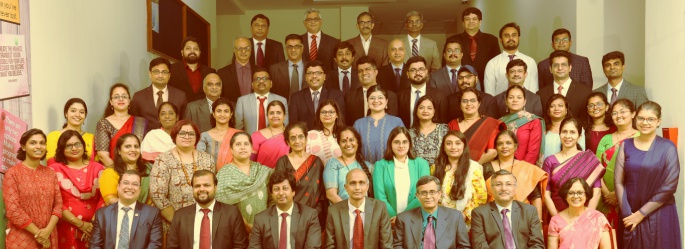Educators Celebrate World Youth Skills Day 2021
Date – 16.07.2021
Publication– BW Businessworld
Page view: 2,151,390
Spokesperson – Prof Jeevan J Arakal
The goal of World Youth Skills Day (WYSD) is to acknowledge and celebrate the importance of equipping young people with crucial skills that prepare them for employment and entrepreneurship. In 2021 the focus on skill-based learning has been highlighted by every education institute and government alike. With NEP 2020 giving special emphasis on vocational and skill training starting from a young age, institutes and industries have come together to help evolve the Indian Education system to provide skills and therefore, an opportunity for all.
HEIs, Government and Market
On the occasion of World Youth Skills Day, 2021 educators across India shared their thoughts on how the pandemic has shifted focus towards skill-based learning and its importance in making people future-ready. To provide the youth with the right skills, professionals need to first decide what those skills are, how they can be attained and who will provide them. This means educational institutes, educators, students, parents, government policies and the job market much work in synchronicity. The market must demand the skills, the education facilities must prepare themselves to provide these skills and the government and other stakeholders must provide the needed support.
“Preparing youth for the future isn’t only about facilitating quality schooling and higher learning, but requires attention to vocational and technical training. The World Youth Skills Day focuses on the aspect of skill development of our youth with quality, affordable vocational and technical education and training. When the youth are properly skilled, it will bring down youth unemployment rates and help resolve future issues.” comments Vicky Jain, CEO, uKnowva
While this is the future we are working towards, there are still several challenges in place. As a nation, educators understand the importance of upskilling the workforce, however Ankit Shyamsukha, CEO, ICA Edu Skills points out that the data suggests India still has a long way to go. He explains, “In our highly-populated country, where the increasing rate of youth unemployment is one of the biggest concerns which has risen in the pandemic, even more, it’s pivotal that we should rethink our education practices and recreate avenues for vocational skill education in order to have sustainable living. If various national and international reports are to be believed, only a small percentage, 5 per cent to 8 per cent of the Indian labour force belonging to the age group of 20-24 years obtained vocational skills through formal means; whereas the percentage of skilled workforce in industrialized countries is quite high as compared to our country. It is between 60 per cent and 96 per cent.”
One should not be discouraged by these figures, instead, this crucial information helps set realistic goals for India as a nation to strive towards. “The ‘World Youth Skills Day’ is a powerful reminder of the urgent need to equip our youth with skills to face contemporary challenges” asserts Jeevan J Arakal, Associate Professor(Marketing), T A Pai Management Institute, Manipal. He further adds, “Academic institutions have a responsibility to provide an education that is rigorous and relevant to the context. Building resilience is also a life skill, hence an education that brings about a change in attitude and mindset is also vital for transforming the lives of our Youth.”
The onus to implement this change cannot completely lie on educators and education institutes alone. As Vinesh Menon, CEO – Education & Skilling Services, AMPERSAND Group points out, “While India enjoys the benefit of demographic dividend, the government must work on a far more outreaching Training& Skilling ecosystem to cater to the 12 million youth that is entering the workforce every year. While the current health crisis has created a natural demand for healthcare service providers, there has been equal demand getting created in many other sectors such as Oil & Gas, Construction, diamond processing, Information Technology to name a few both in India & offshore markets. The Government should move quickly to formulate policies and imagine new paradigms of digital skilling by augmenting the adoption of digital technologies to address the vital aspect of continual skilling & oncoming challenges in international mobility for our youth in a post-Covid-19 world.”
The new National Education Policy 2020 does emphasise the need to start vocational training and skill education from an early age, especially with the accelerated shift toward the digital economy. Every sector has to play its role for any effective change to happen. “India should create formal and structured pathways for labour mobility by the private sector. There exist many organisations that facilitate this international mobility, but a code of conduct will prevent any potential exploitation of migrating workers. International mobility of labour should become an essential part of India’s economic diplomacy. We should work towards breaking down barriers in the international labour supply to ensure hassle-free movement of talent. India should also enable innovative state-supported programs like what is being done by many countries.” suggests Rustom Kerawalla, Chairman AMPERSAND Group.
Crucial Skills
WYSD began in 2014 by the United Nations, to not just spread awareness, but to encourage strategically equipping young people with the needed skills and create discourse on the subject. So what are the skills of the ‘new normal’? Pankaj Sharma, Director-Admissions & Career Services, JK Lakshmipat University states that “The careers opportunities are growing and evolving over the years which means the skill needed to do these jobs have also shifted. The utmost crucial skill needed for future demands is critical thinking, creativity, and emotional sensitivity. Adapting to the corporate world, with its set of ups and downs remains a challenge that people fail to tackle.” Sharma emphasises skills that need to be conditioned from early childhood education, while Kavita Sahay Kerawalla, Vice-Chairperson AMPERSAND Group focuses on the market demand. She states, “The need for skilled manpower amongst the youth in India cannot be underemphasised. Technical & Soft skills need to go hand in hand and the only way to have this combination perfected in the youth is to start them at a nascent age. The National Education Policy 2020 has laid emphasis on this area and has laid down the policy framework to start skilling in schools from Grade 6. NSQF framework must undergo a transition to accommodate new-age courses such as Robotics, Digital Marketing, Machine Learning etc and VR platforms must be used to encourage new dimensions of learning and development along with the regular curriculum. Innovative assessment techniques such as ‘credits’ in lieu of marks proportionate to effective skilling techniques learnt must be encouraged to maintain a balance between academics and vocational education.”
Abhay G. Chebbi, Pro-Chancellor, Alliance University sums this up with his statement, “A search for the skills most in-demand shows technology-related skills only – from cloud computing to blockchain to AI to IoT to cybersecurity. The intersection of infotech and biotech has opened up a new world dominated by algorithms. However, at a generic level, one can argue that the skills most relevant are adaptation and agility.”
Advice for Youth
Shalender Sharma, Director, Education and Skill Development, IPE Global (international development consulting firm) says take a break:
“TAKE A BREAK”
The result of young people facing their second global crisis in a decade is, at best, temporary disruption and disillusionment and, at worst, permanent scarring and lost opportunity. Where can youth find hope? As a start, youth can be taught resilience and self-efficacy through experiential learning and connections to mentors and role models. According to the Global Risks Report by World Economic Forum, deterioration of mental health since the start of the pandemic has left 80% of young people (students/working) across the globe vulnerable to depression, anxiety and disillusionment and making them targets for radicalization.
- Skilling is great, but stressing about it, isn’t: In the midst of re-skilling and upskilling themselves in order to fit in to new working conditions, youth need to acknowledge the importance of mental peace.
- Talk to your mentor for better guidance before learning something new: While the youth is anxious about the current fluctuating employment opportunities, communicating with a mentor or a professional will give them better insights about the path they choose to opt.
- Learn something beyond your work: Skilling is not only about technical knowledge about your work. Range it out by learning something interesting that adds value to the community if not your resume. This will make you feel great!
- Create opportunity for the one in need: Many times we ignore the power of outreach. Utilise your young network and create an opportunity for someone in dire need. This will foster a skill of community development and empathy at the same time.”
M.K. Padma Kumar, Chief Operating Officer, IPE Global (international development consulting firm) adds, there is a shift in perspective towards reskilling and hiring young talent. Stating:
“Recent studies on reskilling show that Chief Human Resources Officers (CHROs) need to think about the effects of large workforce transitions being accelerated by the Covid-19 crisis and how reskilling plays a key role in helping close talent gaps while keeping employees connected to jobs. The agenda for post-pandemic learning and development extends beyond reskilling.
- Broad-based digital training in essential skills
- Focused up-skilling rooted in changing work
- Leadership development
Ever since the pandemic accelerated the push towards a remote work culture, we’ve all learned things in the past few months – be it creating your own home workspace, upskilling or learning and experiencing new technologies, there has been an increase in focus on self-management. As we step into a futuristic world, technology will continue to play a big role in creating a more personalized, continuous professional development and those with strong behavioural skills will be highly sought after. With a more micro, mobile-first, innovative, and on-demand learning approach, applied knowledge will be power, and attributes like communication, resilience, grit, trustworthiness, and adaptability will be equally valued. It is time we invest in sustaining the talent we have and reimagine growth post-pandemic.”
Conclusion
The discourse around skills is crucial to ensure people have the opportunity to participate in the market economy whether it is through employment or entrepreneurship. WYSD offers global leaders a chance to refocus on what the important skills are, and young people the knowledge of how to proceed. It is ultimately up to young people to decide how to proceed forward with this information, as knowing the needed skills is the easy part. As Surabhi Goel, CEO, Aditya Birla Education Academy points out, “The survival of youth in this competitive landscape completely depends on the vigour to gain more knowledge, focus on consistent upskilling sessions, leveraging cutting-edge technologies, and develop the ability to unlearn and relearn fresh information.” She further adds, “As we celebrate World Youth Skills Day, I would like to urge all the young educators to undertake various training programmes that will help them stay relevant in a post-pandemic world. In addition to this, I take this opportunity to reach out to all the young and bright minds of India who will soon jump into the professional bandwagon to consider choosing their career as a teacher as it is one of the most rewarding occupations and provides a huge amount of gratification for being able to impart knowledge to the future leaders.”




